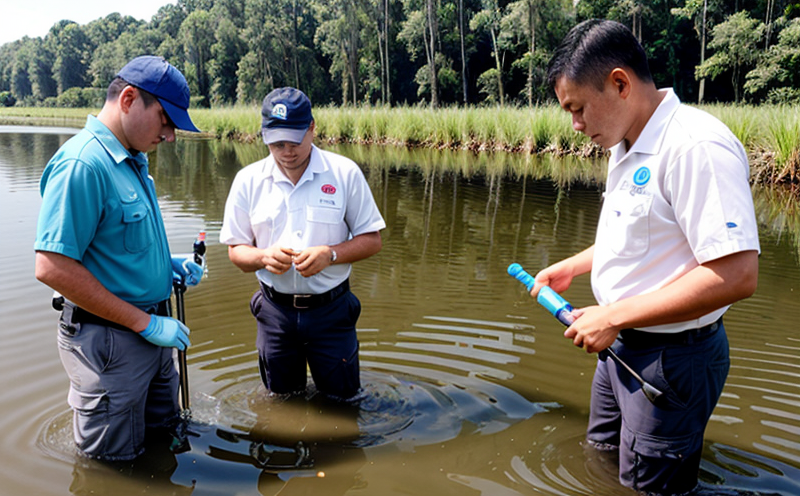Water quality monitoring inspection
The water quality monitoring inspection is a critical process that ensures compliance with local, national, and international standards. This service plays an essential role in safeguarding public health by ensuring potable water meets stringent safety criteria. The inspection involves the systematic evaluation of various parameters including pH levels, turbidity, total dissolved solids (TDS), biological oxygen demand (BOD), chemical oxygen demand (COD), nitrate/nitrite concentrations, and many others.
Our state-of-the-art laboratory employs advanced analytical instrumentation such as spectrophotometers, atomic absorption spectrometers, ion chromatographs, and conductivity meters. These tools enable us to provide precise measurements of water quality parameters according to ISO 6027-1:2018, ASTM D1253, EN 14592, IEC 62268, among others.
The inspection process begins with the collection of water samples from various points in a distribution system. Samples are then transported to our laboratory where they undergo rigorous testing. The results obtained are compared against regulatory guidelines and internal standards set by authoritative bodies like WHO (World Health Organization) and EPA (Environmental Protection Agency).
Our team consists of experienced chemists, microbiologists, and environmental scientists who have extensive knowledge in this field. They use their expertise to interpret the test data accurately and provide detailed reports that include recommendations for corrective actions if any issues are identified.
The importance of water quality monitoring cannot be overstated. Poorly managed systems can lead to contamination incidents which pose significant risks to human health and safety. Regular inspections help prevent such occurrences by identifying potential problems early on, allowing timely interventions before they escalate into full-blown crises.
By offering comprehensive water quality monitoring services, we contribute towards maintaining high standards of hygiene in our communities. This not only enhances public trust but also supports sustainable development goals aimed at improving access to safe drinking water worldwide.
In summary, the water quality monitoring inspection is more than just a regulatory requirement; it's an integral part of ensuring public health and environmental protection. With our dedicated professionals and cutting-edge technology, we strive to deliver accurate, reliable results that meet both current standards and future needs.
Why It Matters
The significance of water quality monitoring lies in its direct impact on human health and the environment. Contaminated water can lead to various diseases ranging from cholera to gastrointestinal infections, affecting millions globally each year. Ensuring clean drinking water is not only a public health priority but also aligns with global sustainability goals.
Waterborne pathogens such as E.Coli and Salmonella pose serious threats if present at levels exceeding safe limits. Monitoring these microorganisms helps prevent outbreaks and ensures safe potable water supply. Additionally, excess nutrients like nitrates can cause algal blooms in lakes and rivers, depleting oxygen supplies and harming aquatic life.
From a regulatory perspective, compliance with standards such as ISO 6027-1:2018, ASTM D1253, EN 14592, IEC 62268 demonstrates commitment to best practices. This not only protects the organization from legal ramifications but also enhances its reputation among stakeholders.
Moreover, regular inspections contribute significantly to long-term sustainability by identifying and addressing potential issues early. Early intervention reduces costs associated with emergency repairs while fostering trust between service providers and end-users.
In conclusion, water quality monitoring is essential for protecting public health, ensuring environmental safety, and supporting sustainable development initiatives worldwide.
Customer Impact and Satisfaction
The implementation of robust water quality monitoring systems has far-reaching benefits that extend beyond compliance requirements. For our clients, this translates into tangible improvements in service delivery and customer satisfaction. Our comprehensive approach ensures that all aspects of water quality are continuously evaluated, providing peace of mind to both suppliers and consumers.
Regular inspections enable us to identify trends over time, helping customers anticipate future challenges proactively rather than reacting to emergencies reactively. This proactive stance builds stronger relationships based on mutual respect and trust.
We understand that every customer has unique needs, so we tailor our services accordingly. Whether you require routine checks or one-off assessments, our expert teams are equipped with the necessary skills and resources to meet those requirements effectively.
Feedback from satisfied customers highlights how our detailed reports facilitate informed decision-making processes within organizations. By providing clear insights into current conditions and future outlooks, we empower clients to make strategic choices that align with their broader goals.
In summary, water quality monitoring inspections contribute significantly to enhancing overall customer satisfaction by delivering reliable information promptly and accurately. This fosters stronger partnerships built on mutual understanding and shared objectives.
Environmental and Sustainability Contributions
The importance of environmental stewardship cannot be overstated in today's world, where sustainability is increasingly recognized as a core component of responsible business practices. Water quality monitoring inspections play a crucial role in promoting environmental health and supporting sustainable development initiatives.
By continuously assessing water quality parameters such as pH levels, turbidity, total dissolved solids (TDS), biological oxygen demand (BOD), chemical oxygen demand (COD), nitrate/nitrite concentrations, among others, we contribute to preserving natural resources. This helps maintain ecological balance and supports biodiversity in aquatic ecosystems.
Our laboratory adheres strictly to international standards such as ISO 6027-1:2018, ASTM D1253, EN 14592, IEC 62268 when conducting these inspections. These guidelines ensure consistency and accuracy in our measurements, thereby enhancing reliability across different regions.
The insights gained from monitoring efforts allow us to identify areas requiring immediate attention or long-term strategies. For instance, detecting elevated levels of contaminants enables timely actions like source water treatment improvements or distribution system upgrades. Such measures help reduce pollution risks while promoting cleaner watersheds and healthier habitats.
Furthermore, our commitment to environmental sustainability extends beyond individual projects through advocacy for policy changes aimed at improving overall water quality standards globally. By sharing best practices and encouraging collaborative efforts among stakeholders, we strive to create lasting positive impacts that benefit everyone involved.
In conclusion, water quality monitoring inspections are vital tools in the quest for sustainable development. They enable proactive measures that protect both human health and our planet's delicate ecosystems, ensuring a healthier future for generations to come.





